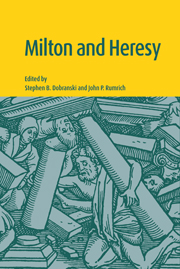Book contents
- Frontmatter
- Contents
- List of contributors
- Acknowledgments
- Abbreviations
- Introduction: Heretical Milton
- PART I HERETICAL THEOLOGY
- PART II HERESY AND CONSEQUENCES
- PART III HERESY AND COMMUNITY
- PART IV READERS OF HERESY
- 11 Asserting eternal providence: John Milton through the window of liberation theology
- 12 Milton's transgressive maneuvers: receptions (then and now) and the sexual politics of Paradise Lost
- Index
11 - Asserting eternal providence: John Milton through the window of liberation theology
Published online by Cambridge University Press: 10 October 2009
- Frontmatter
- Contents
- List of contributors
- Acknowledgments
- Abbreviations
- Introduction: Heretical Milton
- PART I HERETICAL THEOLOGY
- PART II HERESY AND CONSEQUENCES
- PART III HERESY AND COMMUNITY
- PART IV READERS OF HERESY
- 11 Asserting eternal providence: John Milton through the window of liberation theology
- 12 Milton's transgressive maneuvers: receptions (then and now) and the sexual politics of Paradise Lost
- Index
Summary
For the Christian the only safe way is the perilous one; living for the impossible hope, interlacing the prose of actuality with the rhythm of hope, calling defiance to Satan as he squats like a cormorant on the Tree of Life.
INTRODUCTION
This chapter is written for Miltonists and students of Milton; at the same time, it invites consideration of a more general set of questions and problems by linking serious issues in Milton studies with serious issues facing Christian activists today. I offer a reading of Milton's poetry, primarily Paradise Regained and Samson Agonistes, through an imaginative window provided by the contemporary phenomenon of liberation theology.
Analogies, by definition, juxtapose phenomena that are alike in some ways and different in others. Linking Milton's life and works with the thought and actions of Christian activists over four centuries later calls forth questions about what we are doing when we draw analogies between phenomena from different points in history. Such a juxtaposition invites discussion of particular differences and of the very meaning of historical difference. I would like at the beginning to acknowledge the validity of these concerns but at the same time to set them to one side for the moment on the ground that the method I have chosen requires doing one thing at a time.
One advantage of the theoretical self-consciousness of our age has been academic writers' freedom to acknowledge and explore the ideological and practical contexts from within which we inevitably experience and explore our subjects. A related opportunity is for scholars to widen their own experience by entering imaginatively the contexts of others.
- Type
- Chapter
- Information
- Milton and Heresy , pp. 219 - 243Publisher: Cambridge University PressPrint publication year: 1998
- 2
- Cited by

